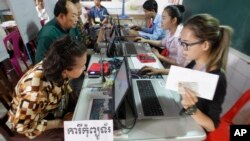Cambodia’s national election body has announced that four parties have put forward candidates for the Senate elections in February.
The National Election Committee (NEC), which has come under fire in recent months for alleged political bias, said that the ruling Cambodian People’s Party, Funcinpec, the Khmer National United Party, and Cambodia Youth Party had all nominated candidates.
The country’s main opposition party, the Cambodia National Rescue Party, which previously controlled a large number of Senate seats, was outlawed last year in a court ruling and will not be able to contest the election.
The NEC allotted the numbers one through four to the parties on the ballot, number one being reserved for Prime Minister Hun Sen’s CPP.
"The order of each political parties on the ballot papers will provide favorable conditions for parties like campaigning, voting, and helping voters recognize the party they like,” NEC Chairman Sik Bunhok, a long-time CPP member, said in a statement.
Dim Sovannarom, an NEC member, said the body had allocated $2 million to the election, which will be held on February 25.
Due to the dissolution of the opposition party, seats held by its members will be contested by other parties.
Some 500 local council seats won by the CNRP in elections last year have already been allocated to minor political parties and the CPP.
Pich Sros, president of the Cambodian Youth Party, said his party was focusing on winning seats in the general election in June and would not expend much effort in the Senate elections.
”I would like to say that we registered for the Senate election, but we have not thought about getting any seats in the Senate,” he said. “We are giving a chance to our commune councilors if we don't register, they will vote for the other parties or sell it to the other.”
Meas Ny, a social analyst, said the results of the election would serve as a litmus test of whether Cambodia was moving further towards becoming a “one-party state.”
Four senators will be selected by the CPP-controlled parliament, while the remainder will be chosen by a vote of commune councilors, who are now almost exclusively composed of pro-CPP officials.




